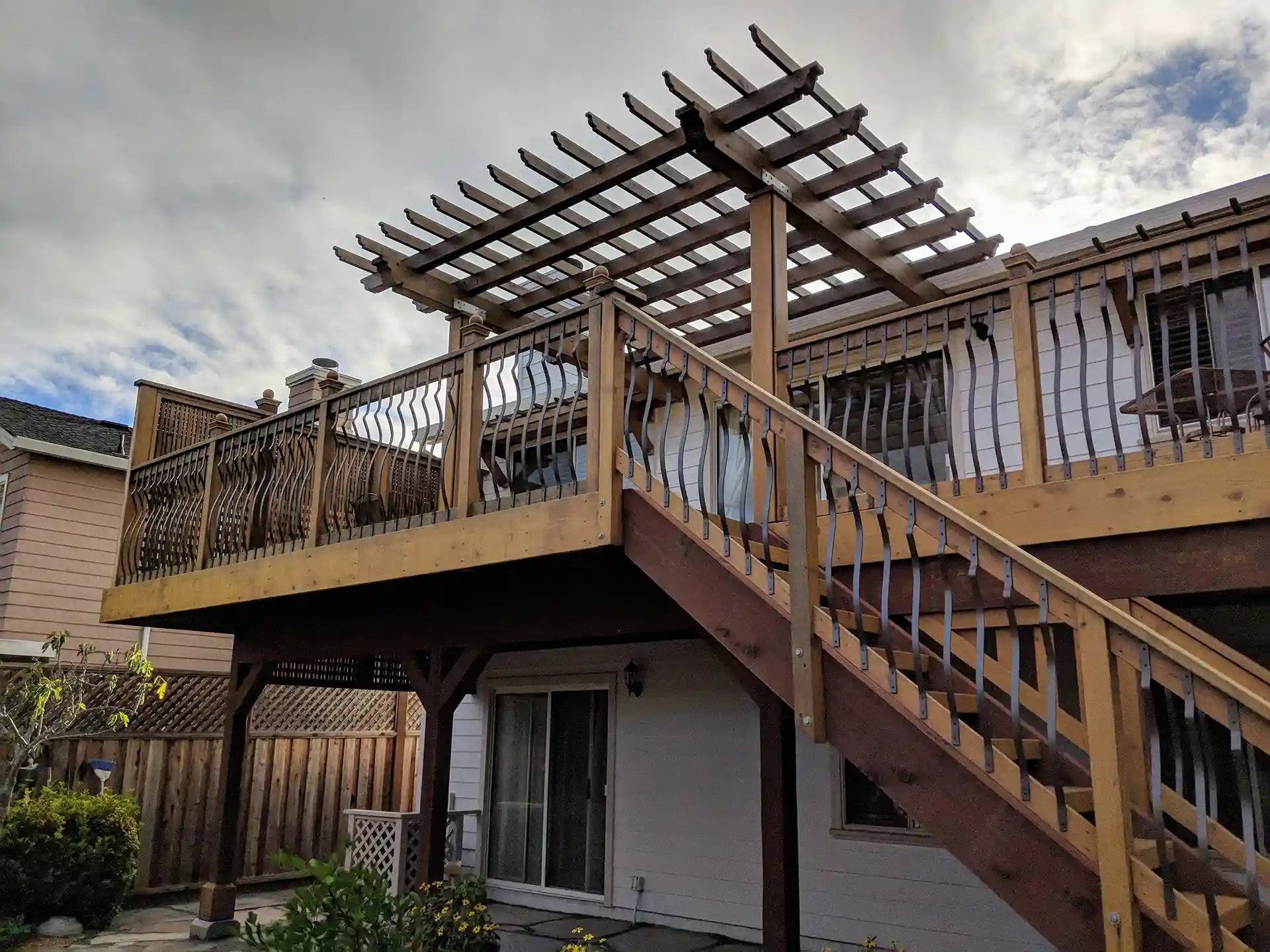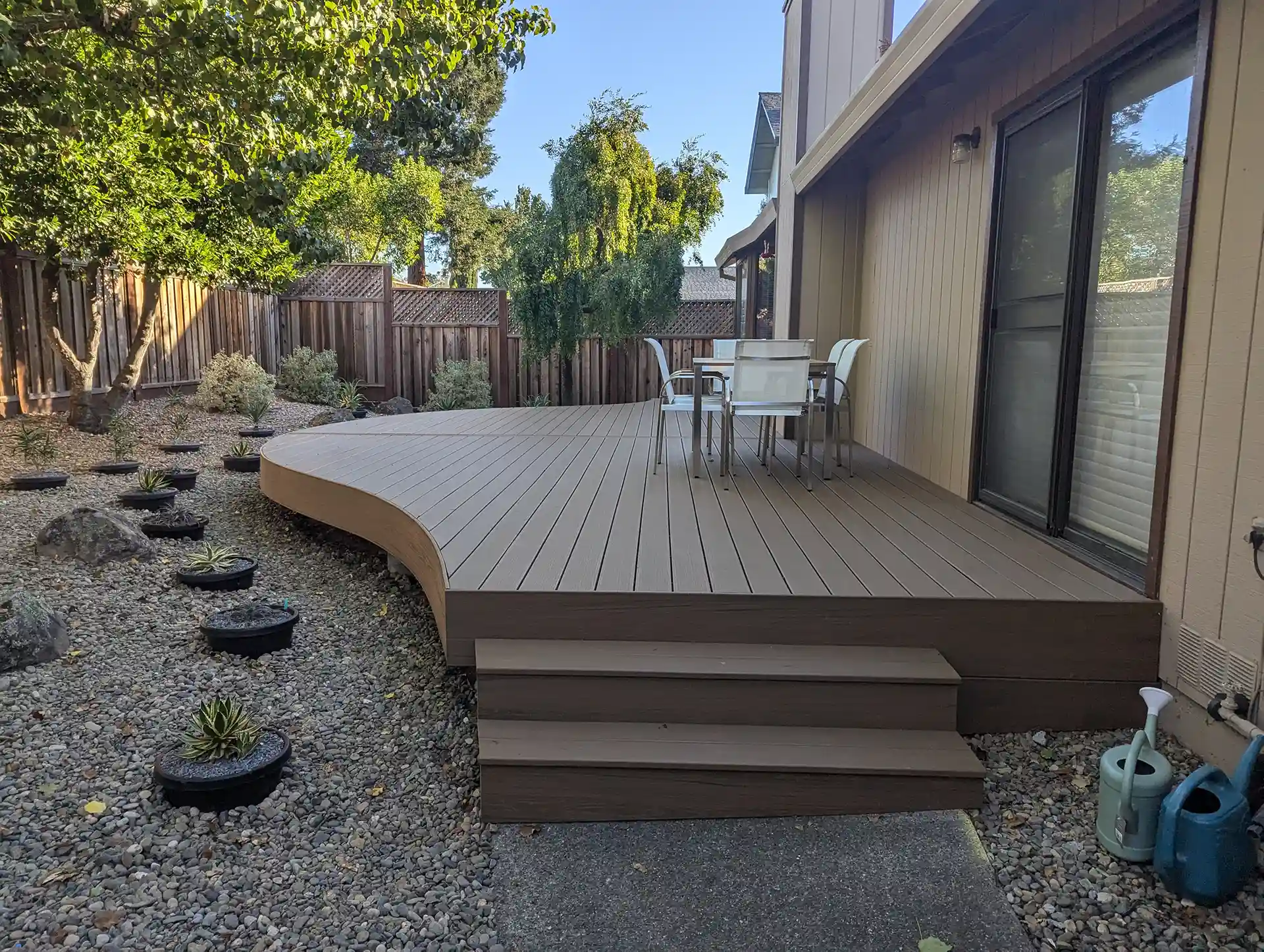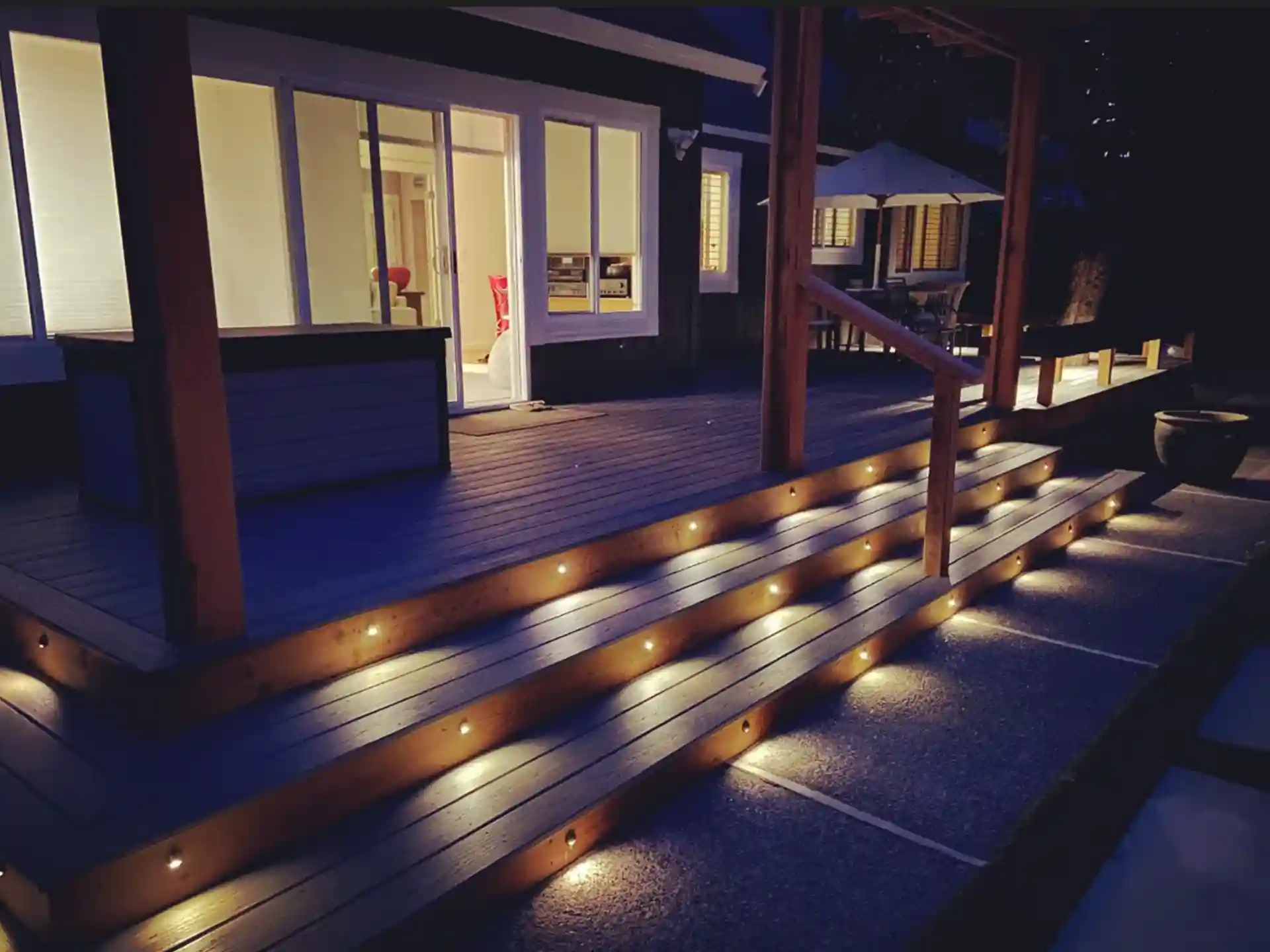
Choosing the right deck design for your home is crucial for improving your outdoor living space and increasing your property value. Whether you want a custom deck, a low-maintenance composite deck, or a multi-level entertainment area, your selected materials and design will shape how you use your outdoor space.
This guide will explore the key features, pros, and cons of 9 popular deck designs, helping you choose the best option for your deck construction project.
1. Custom Deck | Deck Builder & Deck Installation
A custom deck offers a layout with materials and features tailored to your specific needs. Whether you prefer a multi-tiered deck, built-in seating, or a custom railing system, a deck contractor ensures the deck fits perfectly with your home and landscape.
Homeowners can choose from composite decking, PVC, or natural wood, each with different levels of durability and maintenance. A skilled deck installer can also guide you through local zoning regulations and recommend the best materials for your climate.
Technical Insights:
- Structural Engineering: Custom decks require precise load distribution to ensure stability. The joist system, posts, and beams must be designed to support the deck’s weight.
- Material Selection: Composite decking or steel framing can be used for better durability, while PVC offers low maintenance and weather resistance.
Pros:
- Tailored Design: It is custom-built to fit your space and needs, allowing for special features like built-in seating and multi-level arrangements.
- Maximized Functionality: Includes outdoor kitchens, entertainment spaces, or elements that cater to your lifestyle.
- Long-Term Value: Improve the outdoor living area by adding real value to your property.
Cons:
- Higher Costs: Custom designs require specialized materials, skilled labor, and longer construction time, which increases their price.
- Longer Build Time: The process of designing and approving the project takes time, and custom construction generally takes longer than pre-built options.
- Potential Limitations: Some designs may not be ideal for all property layouts orrequire extra engineering.
Tip: Custom decks are ideal if you want a design that fits your needs and integrates with the rest of your home.
Did You Know? Custom decks can significantly increase your home’s resale value, especially when built with materials like IPE or Redwood.
2. Pool/Spa Decks
A pool deck surrounds your swimming pool, offering a moisture-resistant, slip-safe surface. A deck contractor ensures that durable, waterproof materials like composite decking, stone pavers, or textured concrete are used to handle constant water exposure and foot traffic.
Technical Insights:
- Slip Resistance: Materials like textured concrete or Deckorators Voyage composite decking provide extra grip, which is important for wet areas.
- Waterproofing: Composite decking or stone pavers resist water damage and mildew from frequent exposure to wet environments.
Pros:
- Moisture Resistance: Built to withstand constant exposure to water and chemicals, preventing issues like mold, rot, and mildew.
- Safety Features: Slip-resistant surfaces reduce accidents, making them safer around pools or spas.
- Aesthetic Appeal: Designed to fit the pool area, making it a natural extension of your outdoor space.
Cons:
- Higher Maintenance: Regular cleaning is necessary to avoid algae buildup and maintain surface quality.
- Exposure to Pool Chemicals: Chemicals used in pools can cause wear, requiring occasional resurfacing or maintenance.
Did You Know? Installing an in-ground pool averages $42,480 and adds about $21,483 to your home’s value, recouping roughly 51% of the investment. However, the costs and upkeep may outweigh the potential return. Consult a real estate agent to assess if adding a pool is a good idea.
3. Pergolas in Bodega, CA
A pergola adds shade to your deck and is a practical way to improve your outdoor living space. Farrar Construction specializes in Redwood pergolas and Sun-Tough pergolas, ensuring your structure is durable and built to last.
Technical Insights:
- Material Strength: Both Redwood and Sun-Tough materials are designed to withstand Bodega’s coastal conditions, with Redwood offering natural resistance to moisture and Sun-Tough providing UV protection.
- Installation: Pergolas are best installed in a deck construction project, ensuring proper alignment and structural integrity.
Pros:
- Stylish Shade: Offers shade while providing space for lounging and dining.
- Durability: Built with Redwood or Sun Tough materials for lasting performance in coastal environments.
- Increased Property Value: Adds to your home’s aesthetic appeal and functionality, improving the overall value of your property.
Cons:
- Not Fully Enclosed: Offers shade but does not provide full protection from rain or strong winds.
- Additional Costs: Installing a pergola requires professional construction, which can increase overall project costs.
4. Rooftop Decks
A rooftop deck utilizes unused roof space to provide panoramic views and additional living space. These decks require proper reinforcement, waterproofing, and code compliance to ensure safety and long-term durability.
Technical Insights:
- Structural Reinforcement:Rooftop decks require extra support to handle the deck’s weight and ensure structural stability.
- Waterproofing Systems: These decks require waterproofing membranes and drainage systems to protect the roof.
Pros:
- Stunning Views: Offers panoramic views that are impossible with traditional ground-level decks.
- Space Optimization: Ideal for homes with limited yard space, making the roof an extra living area.
- Modern Design: Adds a stylish element to your home, making it a standout feature.
Cons:
- Complex Engineering: The structural requirements can make the project more expensive and time-consuming.
- Weather Exposure: Exposed to the elements, requiring frequent maintenance and protection against the weather.
Did You Know? Rooftop decks are becoming popular in urban areas with limited yard space, especially in cities with high housing demand. According to Harvard’s Joint Center for Housing Studies, 66% of homeowners in urban areas with limited space seek ways to maximize their property value, with rooftop decks being a prime choice. Flat roofs can offer homeowners up to 40% more usable outdoor space when properly reinforced.
5. Multilevel Decks
Multilevel decks are ideal for sloped yards. They create separate zones for dining, lounging, and entertaining. This design maximizes your outdoor space, giving you more room to enjoy different activities.
Technical Insights:
- Post and Beam System: To support each level’s weight, additional posts, beams, and joists are required.
- Water Management: Effective gutter systems and slope adjustments are needed to prevent water buildup on the deck.
Pros:
- Zoning Flexibility: Separate levels allow for distinct areas for various activities, enhancing your outdoor space’s functionality.
- Adaptable to Sloped Yards: Ideal for uneven terrain, providing more usable space.
- Increased Space: Vertical designs can significantly increase the total usable area of your deck.
Cons:
- Higher Costs: More materials and labor are required, which increases the price compared to single-level decks.
- Complex Construction: The need for separate supports and beams for each level increases the time and complexity of construction.
- Ongoing Maintenance: Each level requires independent upkeep.
6. Curved Decks
Curved decks provide a unique and elegant look, seamlessly integrating with your outdoor environment. This design works well with multi-level decks, poolside spaces, or gardens.
Technical Insights:
- Bending Materials: Materials like laminated wood or flexible composite decking create smooth curves without compromising strength.
- Structural Reinforcement: The curves require additional reinforcement to maintain the deck’s integrity.
Pros:
- Elegant Design: Adds sophistication and a flowing look to your outdoor space.
- Space Efficiency: Curves fit into irregular or tight spaces, maximizing your yard’s usability.
- Natural Integration: The design enhances the connection between your deck and the natural landscape.
Cons:
- Costly: Curved designs require specialized materials and precise construction, making them more expensive.
- Complex Modifications: Changing a curved deck can be expensive and complicated once built.
7. Deck Dock
A deck dock integrates a decking area with a dock for those who live on the water. It’s an ideal choice for waterfront properties that require a combination of decking and water access.
Technical Insights:
- Deck Framing: Steel deck framing ensures durability, especially in marine environments.
- Material Choice: Composite decking is moisture resistant and holds up well in humid, wet conditions.
Pros:
- Water Access: Provides easy access to the water, making it ideal for those who enjoy boating or fishing.
- Functional Design: Dual-purpose design that combines decking with a dock area.
- Durability: Resistant to weather, water exposure, and pests, making it ideal for waterfront properties.
Cons:
- Higher Costs: The complexity of combining decking and dock elements increases costs.
- Installation Time: Installation requires additional planning and labor, especially for water access integration.
8. Deck Waterproofing
Deck waterproofing systems, such as DrySpace or RainEscape, prevent water from seeping into the deck structure, protecting the framing and allowing for additional space underneath the deck.
Technical Insights:
- Waterproof Membranes: These systems direct rainwater away from the deck, preventing water damage.
- Added Usability: Waterproofing allows you to use the space underneath the deck for storage or a dry patio.
Pros:
- Protects Deck Structure: Prevents water damage and ensures the deck’s longevity.
- Additional Usable Space: A dry area underneath for storage or a secondary living space.
- Increases Home Value: Adds valuable outdoor space to your property.
Cons:
- Installation Complexity: Waterproofing systems require careful planning and installation.
- Added Costs: Waterproofing increases the total project cost.
9. Deck Railing & Lighting
Deck railings and deck lighting are important elements for both safety and aesthetics. They enhance the functionality and beauty of your outdoor living space.
Technical Insights:
- Railing Materials: Options include cable, glass, or composite materials, each providing different levels of durability and visual appeal.
- Lighting Systems:LED lighting is commonly used for its energy efficiency and long lifespan, often installed along railings or steps.
Pros:
- Safety: Provides necessary safety, especially on elevated decks.
- Aesthetics: Lighting adds ambiance, while railings define the structure and style.
- Customization: Both elements can be tailored to suit the design of your deck.
Cons:
- Cost: Custom railings and lighting systems increase the project’s total cost.
- Maintenance: Wooden railings require regular maintenance, and lighting systems may need occasional bulb replacements.
Materials Comparison: Choosing the Right Decking for Your Home
Selecting the right decking material is critical for the durability and performance of your deck. Below, we’ve compared some of the most popular materials used for deck construction, highlighting the pros and cons of each. This will help you decide on your home and outdoor space.
| Decking Material | Pros | Cons |
| 1. Redwood Decking | – Naturally Resistant: Redwood resists decay, moisture, and pests, making it ideal for Bodega’s coastal climate. | – Requires Maintenance: Regular sealing is needed to prevent moisture and fading. |
| – Sustainable: Sourced from certified forests, it’s an eco-friendly option for deck construction. | – Cost: Higher than treated wood, though still less expensive than IPE. | |
| 2. IPE Decking (Brazilian Walnut) | – Highly Durable: IPE is one of the hardest woods, resistant to moisture, insects, and wear. | – Expensive: One of the more costly decking options. |
| – Low Maintenance: Once treated, IPE requires minimal upkeep. | – Difficult to Install: Its density requires professional-grade tools and expertise. | |
| 3. Composite Decking (Trex, TimberTech, Azek) | – Moisture and Fade Resistant: Composite decking materials like Trex, TimberTech, and Azek are designed for coastal climates. | – Higher Initial Cost: Upfront cost is higher than wood, but it offers long-term savings due to low maintenance. |
| – Low Maintenance: No staining, sealing, or sanding required. | – Heat Retention: Can get hot under direct sunlight, which may be uncomfortable for barefoot walking. | |
| 4. Cedar Decking | – Naturally Resistant: Cedar resists rot and insects, making it a good option for Bodega’s mild coastal weather. | – Frequent Maintenance: Requires regular sealing or staining to maintain appearance and performance. |
| – Affordable: Less expensive than IPE or Redwood. | – Not as Durable: While weather-resistant, it’s less long-lasting than IPE or composite decking. | |
| 5. Tropical Hardwoods (Mahogany, Teak) | – Exceptional Durability: Hardwoods like Teak are moisture-resistant, making them ideal for coastal environments. | – Sustainability Issues: Over-harvesting of tropical hardwoods requires careful sourcing from certified suppliers. |
| – Elegant Appearance: Dark tones of Mahogany and Teak create a luxurious look. | – Expensive: High cost for both material and installation. |
The Right Deck Design for Your Home
At Farrar Construction, we specialize in custom deck building, from Redwood and IPE to low-maintenance composite decking. As the only Platinum-certified Trex Pro builder in the North Bay, we offer superior craftsmanship and expert guidance for every project. From deck lighting to waterproofing systems, we ensure your deck is beautiful and functional.
Ready to build the perfect deck for your home? Contact Farrar Construction today for a free consultation. Explore our project gallery to see our past work and get inspiration for your outdoor living space.
Let’s get started on your outdoor living project!


